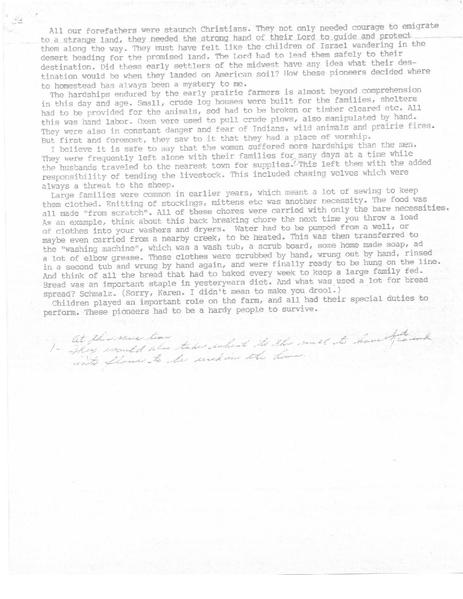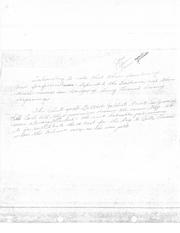File:Mytle Forefaters.pdf
From CowTales
 Size of this preview: 463 × 599 pixels. Other resolution: 464 × 600 pixels. |
Forefaters
All our forefathers were staunch Christians. They not only needed courage to emigrate to a strange land, they needed the strong hand of their Lord to guide and protect them along the way. They must have felt like the children of Israel wandering in the desert heading for the promised land. The Lord had to lead them safely to their destination. Did these early settlers of the midwest have any idea what their destination would be when they landed on American soil? How these pioneers decided where to homestead has always been a mystery to me.
The hardships endured by the early prairie farmers is almost beyond comprehension in this day and age. Small, crude log houses were built for the families, shelters had to be provided for the animals, sod had to be broken or timber cleared etc. All this was hand labor. Oxen were used to pull crude plows, also manipulated by hande. They were also in constant danger and fear of Indians, wild animals and prairie fires. But first and foremost, they saw to it that they had a place of worship.
I believe it is safe to say that the women suffered more hardships than the men. They were frequently left alone with their families for many days at a time while the husbands traveled to the nearest town for supplies. This left them with the added responsibility of tending the livestock. This included chasing wolves which were always a threat to the sheep.
Large families were common in earlier years, which meant a lot of sewing to keep them clothed. Knitting of stockings, mittens etc was another necessity. The food was all made from scratch. All of these chores were carried with only the bare necessities. As an example, think about this back breaking chore the next time you throw a load of clothes into your washers and dryers. Water had to be pumped from a well, or maybe even carried from a nearby creek, to be heated. This was then transferred to the "washing machine", which was a wash tub, a scrub board, some home made soap, and a lot of elbow grease. These clothes were scrubbed by hand, wrung out by hand, rinsed in a second tub and wrung by hand again, and were finally ready to be hung on the line. And think of all the bread that had to baked every week to keep a large family fed. Bread was an important staple in yesteryear’s diet. And what was used a lot for bread spread? Schmalz<ref>Schmalz Recipe</ref>. (Sorry, Karen. I didn't mean to make you drool.)
Children played an important role on the farm, and all had their special duties to perform. These pioneers had to be a hardy people to survive.
<references/>
Notes:
At the same time they would also take wheat to the mill to have wheat ground into flour to be used in the home.
Jaus/Harms/Michael Gabbert
Interesting to note that these families of our forefathers befriended the Indians and they were never in danger of being harmed during uprisings.
The chest Gottlieb Gabbert built in Germany held all their possessions during the ocean trip. It was always kept packed with the most valuable possessions to be rolled into the ox cart for the trip to Belle Plaine when the Indians were on the warpath.
source:Myrtle Jaus Memories. Copywrite:Myrtle Jaus Meyer.
File history
Click on a date/time to view the file as it appeared at that time.
| Date/Time | Thumbnail | Dimensions | User | Comment | |
|---|---|---|---|---|---|
| current | 14:45, 18 March 2018 |  | 1,275 × 1,650, 2 pages (611 KB) | Jbaur (Talk | contribs) | {{subst:Myrt Memories}} |
- You cannot overwrite this file.
File usage
The following page links to this file:
